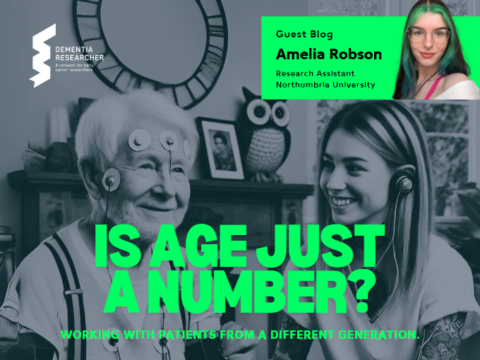Welcome back to my corner of the dementia researcher blogs! If you’re new here, it’s important to know for the context of this blog that I have been a researcher for 8 years now. That’s 8 years that I have loved but not everyone gets why people enjoy research. It’s often challenging and unpredictable. You can have sleepless nights and consecutive bad results. So why do researchers do what they do?
The idea behind this blog was triggered by a memory of a time I was talking to an undergraduate project student. It was during my PhD and they were doing their final year research project in my lab. Their experiments weren’t working and they were very unhappy about that. I said something along the lines of “you can’t take it personally, this is normal in research” to which they replied “why do you do this to yourself?”
I think about that question from time to time; usually when an experiment hasn’t worked out the way I hoped. Research is fundamentally built on challenging ideas and trying to make new discoveries. It is inevitably a path laid on foundations of troubleshooting and it is impossible to avoid experimental failure. This can be a difficult thing to get used to but it is an important point of the scientific endeavour. I might have said this in a previous blog but I genuinely believe that when every experiment works every time, it can often be a sign that the work is not cutting edge enough. There are exceptions of course, but if you are struggling try and take solace in the idea that you are probably doing something nobody has tried before. That’s pretty cool if you ask me!
It is, however, far from the path of least resistance to pursue and academic career. I often say it’s a bit like being a footballer (minus the salary of course). You start out as an “academy prospect”, studying for your undergrad and trying to demonstrate your potential to yourself and your lecturers. Next you move onto something like a PhD… this is where you find yourself moving into the senior team but still very much a youth player. Up next it’s your playing career; your postdoc. You are judged on your output (papers and grants, not goals) and have to negotiate a series of short term contracts to keep “playing”. Finding a new post can be a bit like a transfer window but in reverse. You have to find a “club”, they don’t come for you. Finally you step up into management as a lecturer where you now have the responsibility of guiding your team of researchers. Again you are judged on outputs in the form of papers and grants and there is pressure to keep performing. Much like football, your playing career is probably over in your mid 30s at which point you trust the next generation to continue. It is a very tricky path to navigate but there is a reason so many choose to do it.
So let’s answer the big question that lies in my title this month. Why pursue research if it can be so mentally and emotionally challenging?
Well… there’s a long answer and a short answer. The short answer is it’s intriguing, exciting and rewarding. For the longer answer, let me tell you why I have found my work in research to be like nothing else I’ve ever done.
 I want to start with the first buzzword I just dropped; intrigue. When you pursue a career in research you also chase down an idea. A question that really peaks your interest and you want to find the answer. This is something that I noticed when I was at my first conference. I was 6 months into my PhD and we were in Taiwan. I had spent the day listening to people talk passionately about their work. The conference had ended for the day and we were sat in a little Belgian bar, in Taiwan, drinking Yorkshire ale (don’t say I’m not cultured). After drink 2 or 3, I noticed everyone was still talking about their work with big smiles on their faces, laughing and discussing new ideas. I had a realisation… these people get paid to follow their interests and they go around the world and tell people about it. When you are in that situation, all those failed experiments don’t really matter. If anything, they probably led you down a path that was even more interesting. You are among like-minded individuals and it’s one of those moments when you realise how lucky you are to do such a job.
I want to start with the first buzzword I just dropped; intrigue. When you pursue a career in research you also chase down an idea. A question that really peaks your interest and you want to find the answer. This is something that I noticed when I was at my first conference. I was 6 months into my PhD and we were in Taiwan. I had spent the day listening to people talk passionately about their work. The conference had ended for the day and we were sat in a little Belgian bar, in Taiwan, drinking Yorkshire ale (don’t say I’m not cultured). After drink 2 or 3, I noticed everyone was still talking about their work with big smiles on their faces, laughing and discussing new ideas. I had a realisation… these people get paid to follow their interests and they go around the world and tell people about it. When you are in that situation, all those failed experiments don’t really matter. If anything, they probably led you down a path that was even more interesting. You are among like-minded individuals and it’s one of those moments when you realise how lucky you are to do such a job.
That brings me on to my second point… excitement. When you get a good result, the buzz you get is fantastic. It often confirms that your idea may have weight. You’re on to something new and the feeling that you may have made a genuine discovery, no matter how big or small, is hard to describe. Someone once told me “if you get a good result, run with it”. This is especially true if you have been battling through failed experiments for some time. When that good result comes in you can’t wait to tell people about it and you want to see how far you can take it. You also can’t wait to get to your next conference so you can tell people about your findings… over a Yorkshire ale of course.
Those good results feed into the other key reason I love research. It is rewarding. It doesn’t always feel like it. Sometimes you feel like you are banging your head against the wall but when you start to see genuine progress in your work (and it is your work), it is so rewarding to see. It makes it all worthwhile.
Finally, having worked shifts where you have set break times, the freedom you get in research is so refreshing. If it’s 11am and I want to get a coffee, I go get a coffee (within reason… don’t leave vital experimental steps unattended of course!) There is no “boss… is it okay if I go get a drink). You have genuine independence and I find this incredibly freeing after many years of shift work. Research may not be for everyone, but it certainly suits me. Maybe it will suit you too.

Dr Sam Moxon
Author
Dr Sam Moxon is a biomaterials scientist at the University of Manchester. His expertise falls on the interface between biology and engineering. His PhD focussed on regenerative medicine and he now works on trying to develop 3D bioprinting techniques with human stem cells, so that we better understand and treat degenerative diseases. Outside of the lab he hikes through the Lake District and is an expert on all things Disney.
Why did you follow a career into Dementia Research? Reply in the box below

 Print This Post
Print This Post




